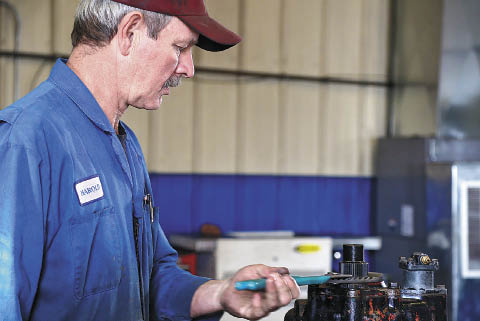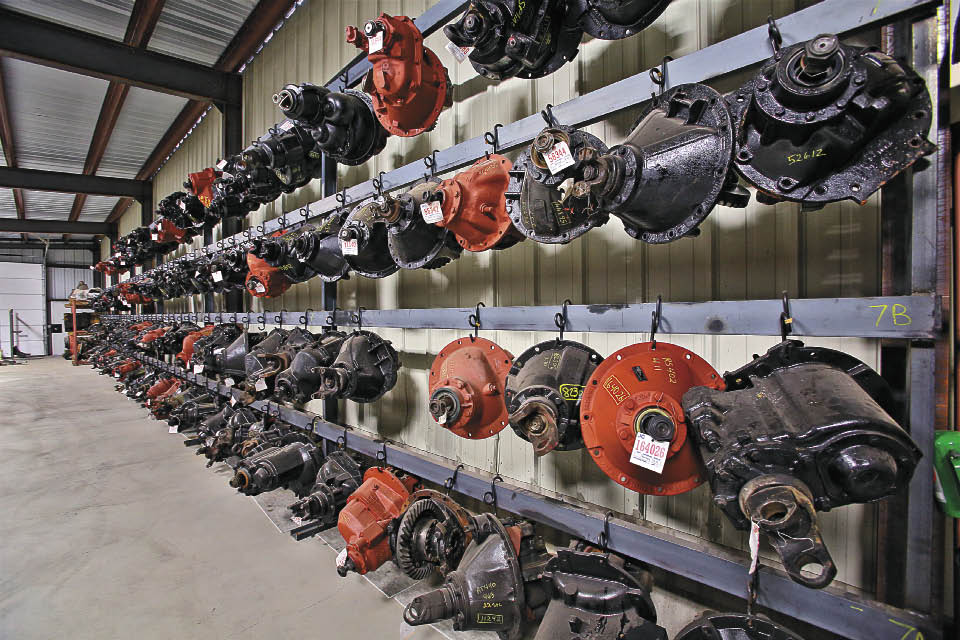
Every generation prior to the disposable generation has had to live by the proverbs "Waste not, want not," and "Make do or do without." If you didn't have it, that was too darn bad. And just because something was broken, it didn't mean you could just toss it. You had to either fix it or live without it.
The number of people in the 21st Century who have no idea what the word "salvage" means-other than to define it as a misnomer for "junk"-is growing at an alarming rate. However, growers will always see the value in salvaging good parts from an otherwise foregone vehicle, be it victimized by an accident or violent, 70-plus-mph winds on I-80 in southern Wyoming. Thankfully, when trucks are involved in wrecks, there are almost always parts to be salvaged. And as long as growers use semis and 10-wheelers, they'll always need truck parts.
Holst Truck Parts in Ucon, Idaho, has relied on the business of growers for more than 80 years, first as an eastern Idaho repair shop prior to World War II before becoming the national truck parts behemoth it is today.
Now in its third generation, Holst Truck Parts is continuing to diversify and serve anyone throughout the world who needs truck parts-including growers.
James E. Holst was a resident of Ucon, a small community just a few miles north of Idaho Falls, when he left as a teenager for Seattle to attend mechanical engineering school. He returned to Ucon, and in 1932 he opened his own shop, repairing local cars and pickup trucks.
During World War II, it became next to impossible for growers to acquire the machinery they needed for farm work. James saw an opportunity and started buying old vehicles, tearing them apart and building farm machinery to sell. After he'd pull the parts he wanted, he'd store what was left of the vehicles behind his shop.
Gradually, people started asking him if they could buy parts off of some of those wrecked vehicles, which were just sitting out in the yard under the mercy of the elements. Eventually, James received so many inquiries about parts that he found he made more money selling parts than fixing and building farm machinery. In the 1970s, the eastern Idaho shop that had started repairing vehicles in the 1930s made the complete transition to a truck parts business.
James's son Jon-who was born when James was almost 48 years old-grew up around the business.
"I've been in this business ever since I was old enough to walk and pick up a wrench," Jon says. "It's all I ever knew."
As soon as Jon graduated from high school, he was in the business full-time. His father was 65 years old and ready to retire, and so by the time Jon turned 21 in 1975, he was running the place-buying the business from his parents outright in 1982. He and his wife, Shauna, made the business a corporation and have sold stock in the company to shareholders.
Today, with their 30 acres of truck salvage and 40,000 square feet of building and warehouse space, Holst Truck Parts' primary business is pulling usable parts off of wrecked and disabled trucks, testing and cleaning those parts and then selling them. Unused parts are used for scrap. Holst also sells new truck parts, rebuilds transmission differentials, installs parts and sells rebuildable trucks.
"Pretty much anything to do with trucks, we do it," he says.
Trucks and their parts come from all over the U.S. The Holsts travel great distances to haul them back to eastern Idaho, only to turn around and re-sell them within a short period of time-sometimes within 48 hours-all over the world, to places such as Central America and Europe.
"We do quite a bit of business on the Internet," he says.
Their business used to be very seasonal-their busiest times were during planting and harvest-but because they've diversified their markets, nowadays they're pretty steady year-round.
"The potato industry is still bread-and-butter in this valley," Jon says, but adds, "I see it changing to a degree-a lot of the small operations bought up by the conglomerates."
He says the trend of smaller operations being squeezed out of existence by larger operations is "disturbing." While in a way it's easier for them to handle fewer customers but earn the same revenue, his close relationship to his customers makes it a difficult thing.
"We hate to see that. We love our customers," he says. "They're not just customers, they're friends."
In the nearly 40 years he's been serving the agriculture industry, he says the most important time for everyone to work together is when prices are good-not just when prices are below the cost of production.
Good times for growers spell good times for Holst Truck Parts.
"When potato prices are good, our sales shoot up. [Growers] buy the break-down stuff all the time, but when prices are good, that's when we start selling parts to guys that are building farm trucks and updating [equipment]."
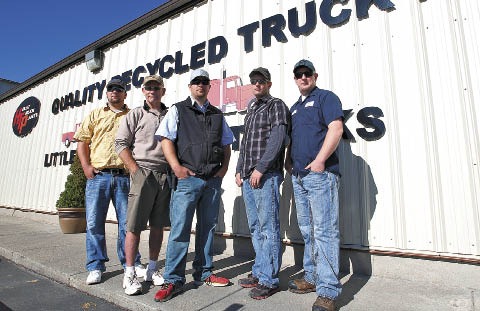
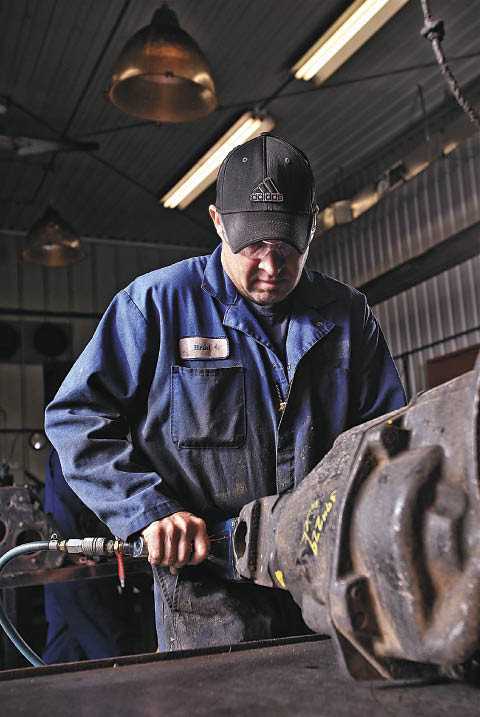
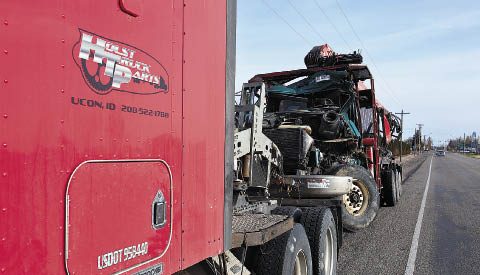
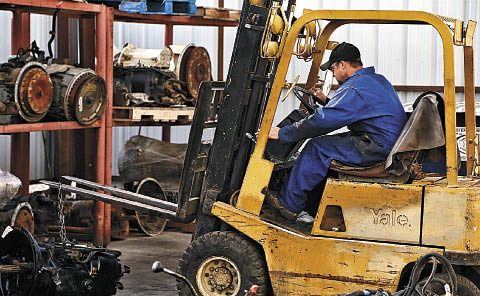
Delegation
All four of his sons-Chris, Mike, Dennis and Jon Jr.-now run the business and its subsidiaries. Chris and his brother Mike are stockholders and part-owners of Holst Truck Parts. Chris is the sales manager, and Shane Piquet is the general manager. In total, there are 25 employees at the main site.
Dennis and Jon Jr. run a separate business called Holst Collision Center, located a few blocks away, which installs oil field pumps, sells oil fuel traders, rebuilds wrecked trucks and more for the oil fields. That business employs five.
Jon says that Holst Collision Center was completely the brain child of Dennis and Jon, Jr.
"They just dived into that, and it blossomed," Jon says. "They own almost 100 percent of the stock in that company. They could boot me right out anytime they wanted."
Because work is no longer strictly seasonal, but pretty consistent throughout the year, Jon and his sons break up the winter by heading down to Moab and doing what they love doing best-dirt biking.
"I'm an avid dirt biker," he says. "I love to dirt bike."
He also loves his grandchildren. With four of his six children-all his sons-working in the family business, all 14 grandchildren except three live within a mile of his home. (The other three grandchildren live in Neola, Utah, near Vernal.)
Today, Jon does 80 percent of inventory purchasing, in addition to managing the accounting and taxes, but he keeps pretty busy with an almost-full time responsibility over a congregation in his church.
"I'm not a great delegator," he says, "but I've learned to do that. That makes [the load] a lot easier-if you don't micro-manage too much."
The transition wasn't too difficult because, just like himself, his sons have been around the business since they were old enough to pick up a wrench.
While his sons are running the businesses, Jon enjoys finding good purchases and traveling the country too much to quit.
"I don't want to quit; I won't retire. As long as I can still walk across the street, I'll be here."

